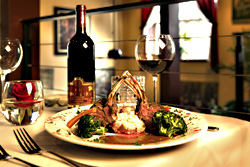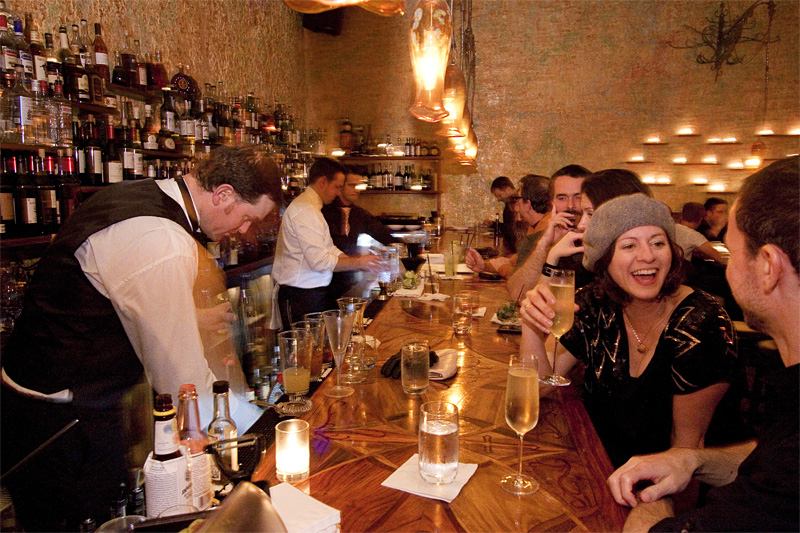Not unlike the meandering Danube River itself, the peripatetic menu at Danube Bistro starts in the Czech Republic (svickova), then passes through Hungary (goulash), Russia (beef stroganoff), Slovakia (chicken Montenegro), Austria (Wiener schnitzel), France (trout amandine), and San Francisco (cioppino) before dissolving into the vast waters of “Continental cuisine.” And as along the river, there are peaks and valleys, charming passages alternating with blank, empty stretches. Both Danubes can be pricey to traverse, but only the bistro provides bread dumplings on the side.
Lubos Szabo, a Slovak, and his wife, Nancy Montalvo, opened Danube Bistro three months ago in Bellevue’s rapidly growing downtown, a few blocks off the shopping–dining arteries that are flush with money during dinnertime. Working out of a microscopic kitchen, the owners’ chef, Martin Smejkal, puts out business-crowd lunches and bistro dinners that draw a clientele whose English is inflected with the accents of Danubean languages.
Smejkal’s bread dumplings, or knedliky, are quite possibly the world’s most perfect expression of starch: Torn-up bread is mixed with milk, flour, and seasonings into a batter. Then it’s rolled into a log as big around as an English muffin, wrapped in cloth, and boiled. Sliced into half-inch ovals, the dumplings come out airy, white, and soothing, their Swiss cheese–like holes the ultimate sponge for every last quarter-teaspoon of meat juices on the plate. Knedliky are to Wonder Bread what the éclair is to the Twinkie.
Three or four of these dumplings come with the goulash, a thick, wine-darkened beef stew that’s so rich, Dilettante could almost claim ownership. The dumplings pick up all the syrupy, caraway-scented braising liquid from the sweet red cabbage that accompanies a roast duck whose fat has melted away in the oven, leaving crackly skin and well-basted meat. (The ultrasweet cabbage only works as a counterpart to the meat; its sweetness overpowers the dumplings.) Knedliky also come with the chicken paprikash, a Wednesday-night mom dinner once loved by the Hapsburgs. The chef’s version is more maternal than imperial: strips of chicken breast meat sautéed with an orange-hued sour cream sauce that fills up a hollowed-out green pepper and spills out and over, slowly enveloping the dumplings.
But more important, the dumplings are part of Danube’s two best dishes: The first is a Holy Trinity called “vepro, knedlo, zelo”—roast pork slathered in sauerkraut, the wine-braised cabbage, with its soft tanginess, serving as both vegetable and sauce. The second is svickova (pronounced svitch-kova), a couple of paper-thin slices of beef tenderloin marinated and then half-braised, half-roasted, along with roots like onions, carrots, and parsnips. The roasted vegetables are pureed into a creamy sauce the color of a beaten egg, which covered the plate. The sauce was the heart of the dish, with delicate traces of lemon zest bringing out the sweetness of the carrots and parsnips. I dispatched the beef in a few bites but barely missed it after it was gone, and only stopped eating the sauce when the last bite of dumpling was gone.
There are quite a few dishes on the menu that aren’t served with dumplings—salmon with beurre blanc, for instance, or radiatore with Gorgonzola sauce, or rack of lamb with cognac-mustard sauce (at $29, the steepest price on the menu)—but I didn’t order a single one; if it looked like something I could order at a golf club, then that’s where I’d prefer to eat it.
Similarly, the appetizers ranged from bistro clichés like crab cakes and Caesar salads to unfamiliar Czech bites; but this time the quality was less predictable. Balsamic vinegar dripped off every leaf of a spinach salad, drowning out the flavors of the red onions, goat cheese, and brown-sugar-coated walnuts tossed with the greens. Conversely, the fried calamari, another appetizer I’ve all but given up on, was so good—coated with just the right amount of batter to get all nubbly and crunchy in the fryer before the squid could turn to rubber—we had no need to dip it in marinara sauce. A squeeze of lemon was perfect. Though garnished with minced, unseasoned roasted red peppers, chopped-cauliflower croquettes the size of hamburger patties were perfectly tasty. And a sausage plate had a few slices of hearty, well-smoked Eastern European dry-cured sausages, as well as smoked Gouda and Brie. The only Danube-sounding dessert is a decent apple-walnut strudel with whip-cream pompons, a scoop of vanilla ice cream, and chocolate-syrup squiggles worthy of Jackson Pollock.
Montalvo is the main server, and if you sit on the first floor of the small, high-ceilinged restaurant, under the mezzanine, she’s solicitous without butting in on the conversation—and she remembered me when I returned a month after my first visit. Up on the brighter, quieter second level, where the pale yellow walls emerge from the shadow of the mezzanine, it’s easier to get stranded, though the chef shyly made the rounds of all the tables once the dinner slowed.
Given the warmth of the owners and the tastiness of the restaurant’s Eastern European food, I enjoyed both of my meals at Danube Bistro—up until a certain moment. That moment was paying the bill. I waited to share the bad news with my guests until after we’d waved good-bye to our hosts. We’d be burbling away about how satisfying the goulash or the sauerkraut was and just as we turned the corner, I would lean over and whisper, “That meal cost us $50 a person.” All signs of contentment would disappear, replaced by quick flashes of disbelief, then outrage, settling finally into disappointment.
Why begrudge paying special-event prices to a homey, perfectly lovely mom-and-pop bistro serving food with no pretense and good flavors? I’m sure downtown Bellevue is no cheap place to do business, but for $40–60 a person, I expect more polish, complexity, theatricality—not a bowl of stew with a couple of pieces of steamed broccoli and a little chopped parsley around the rim. I wish Szabo and Montalvo all the happiness and customers they hope for. I also wish they’d drop entrée prices five to 10 dollars so I could indulge my new craving for svickova and dumplings without feeling like I’ve signed up for a three-day cruise.
Price Check Spinach salad $8 Calamari $8 Goulash $19 Vepro, knedlo, zelo $20 Roasted duck $21 Svickova $26 Strudel $7.50






